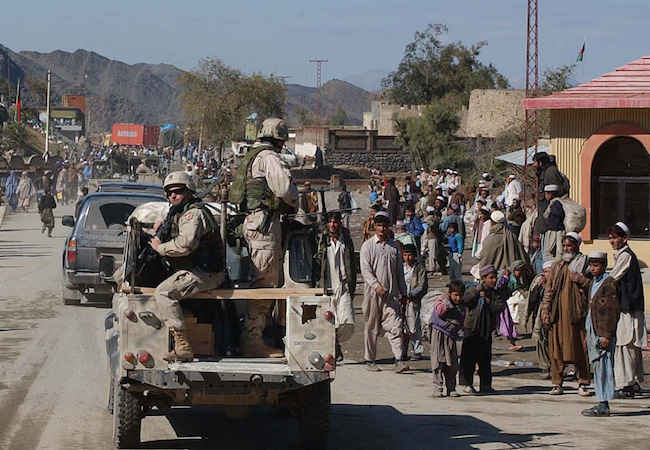
By Zahid Khan
Torkham is an international border crossing of Durand line between Afghanistan and Pakistan. It is a juncture of Nanghar province of Afghanistan with Pakistan’s Federally Administered Tribal [FATA] and Khyber Pukhtoonkhwa—One of the busiest port of ingress between the two states, serving as a vital receiving, transporting and shipping site. From Afghanistan, the highway-7 has a junction with Torkham to Kabul via Jalalabad. On the Pakistani side, the border crossing is at the end of the N-5 national highway, which connects it to Peshawar in the east. There are two main controlling agencies of Torkham border, Afghan Border Police [ABP] and Pakistan’s Frontier Corps [PFC]. NATO forces also supporting on the Afghan side of the crossing, mainly personnel of the US Armed Forces. The American Forward Operating Base [FOB] Torkham is located a few miles from the crossing in Nangarhar province.
Foreign office statement said, the escalation of tensions and confrontations on Torkham border, Pakistan and Afghanistan on June 20, 2016 agreed to find a pragmatic remedy as both sides spoken pledged to resolve exclusive border management controversy bilaterally. Fighting outset when Pakistan started construction of a gate at the border to control over militants and terrorists crossing over from Afghanistan—Afghan soldiers initiated firing first and triggering diplomatic-tensions between the two neighboring states. Both sides comply on a ceasefire on Thursday, and it was ascertained that an Afghan delegation led by deputy foreign minister Hekmat Khalil Karzai would visit Pakistan for bilateral talks on Monday. The Afghan delegation visited on the invitation of Foreign Affairs Advisor Sartaj Aziz.
On Pakistani side, the meeting led by Foreign Secretary Aizaz Choudhry—told the members of meeting that management of the Torkham border is essential to control over terrorism. Further said, that border management would prevent non-state actors from inflowing and thwart the smuggling of goods —it will remain mutual benefit to the both states not merely Pakistan. A statement from the Afghan foreign ministry said the talks were held in an harmonious and friendly environment but said Karzai had raised what it called, various violations by Pakistan, including configurations of check-points in Afghan territory. Hence, he stoutly protested against Pakistan’s current unprovoked artillery shelling of Afghan villages, it said. Thousands of vehicles normally pass through the crossing every week, making it a vital trade link between the countries.
After six days the ceasefire declared—détente assured between the two states— the Torkham border was re-opened on Saturday. However, Army troops and tanks have been deployed by both sides. The two sides decided to carve up their ideas with the leadership, as these will be negotiated during a meeting between the Sartaj Aziz and Afghan Foreign Minister on the sidelines of the forthcoming Shanghai Cooperation Organisation [SCO] summit in Tashkent from June 23-24, 2016. The call for a designing appropriate mechanism for gathering on border management issues for also spotlight during the meeting. The participants comply on successful border management being crucial for encouraging peace, countering militancy, terrorism and strengthening relations between the two countries. Afghan Deputy Minister Hekmat Khalil Karzai also paid a courtesy call on Sartaj Aziz.
Sartaj Aziz has recapitulated in a BBC interview on Sunday—the gate would be built at all costs. Pakistan is neither breaching any bilateral accord with Afghanistan nor any international law and forewarn that Pakistan would strike back if attacked again. Aziz said, almost 50,000 people cross the Torkham border without questioning. These travelers include all sort of people. We told Afghanistan in May that from June 1, no one will be permissible to cross the border without legal visa or travel documents, he added. On Monday, dozens of Pakistani traders protested outside the provincial parliament in Peshawar, demanding that Afghan refugees be deported. Pakistan hosts some 2.5 million Afghans who have fled fighting in their home country. A protest leader said the free movement of Afghans into Pakistan had destroyed peace in the country and needed to be checked. The gate, which, he said, was being built 30-35 metres inside Pakistan’s territory, would be opened for traffic.
Assistant Political Agent [APA] for Landikotal Rahimullah Mahsud stated—they had conveyed the message of re-opening the Torkham border to the Afghan officials—the message was conveyed by Major Tauqeer of the Frontier Corps [FC] —Afghan border security chief Colonel Nisar Khan Shinwari thanked the Pakistani officials for the munificent step, as it had created détente and ceasefire between the two states. Quoting Colonel Nisar Shinwari, Rahimullah Mahsud said thousands of passengers had been stranded on the Afghan side of the border. He said the Afghan officials had requested to allow the trade- trucks carrying foods and non food items via Torkham as prices of these commodities had giant in the last six days in Afghanistan.
Rahimullah Mahsud said as a compassion gesture, the Afghan and Pakistani officials hugged each other at the Torkham border and offered prayers for the departed souls of the Afghan soldier and the Pakistan Army Major Ali Jawad Chengezi who were martyred in the exchange of fire four days ago. Rahimullah Mahsud said the offices of the Pakistan Customs[PC], Federal Investigation Agency [FIA] and National Logistics Cell (NLC) had re-opened and resumed for work. in the interim, a high number of Afghan citizens having valid visa or travel documents crossed the Torkham border and arrived in Peshawar.




